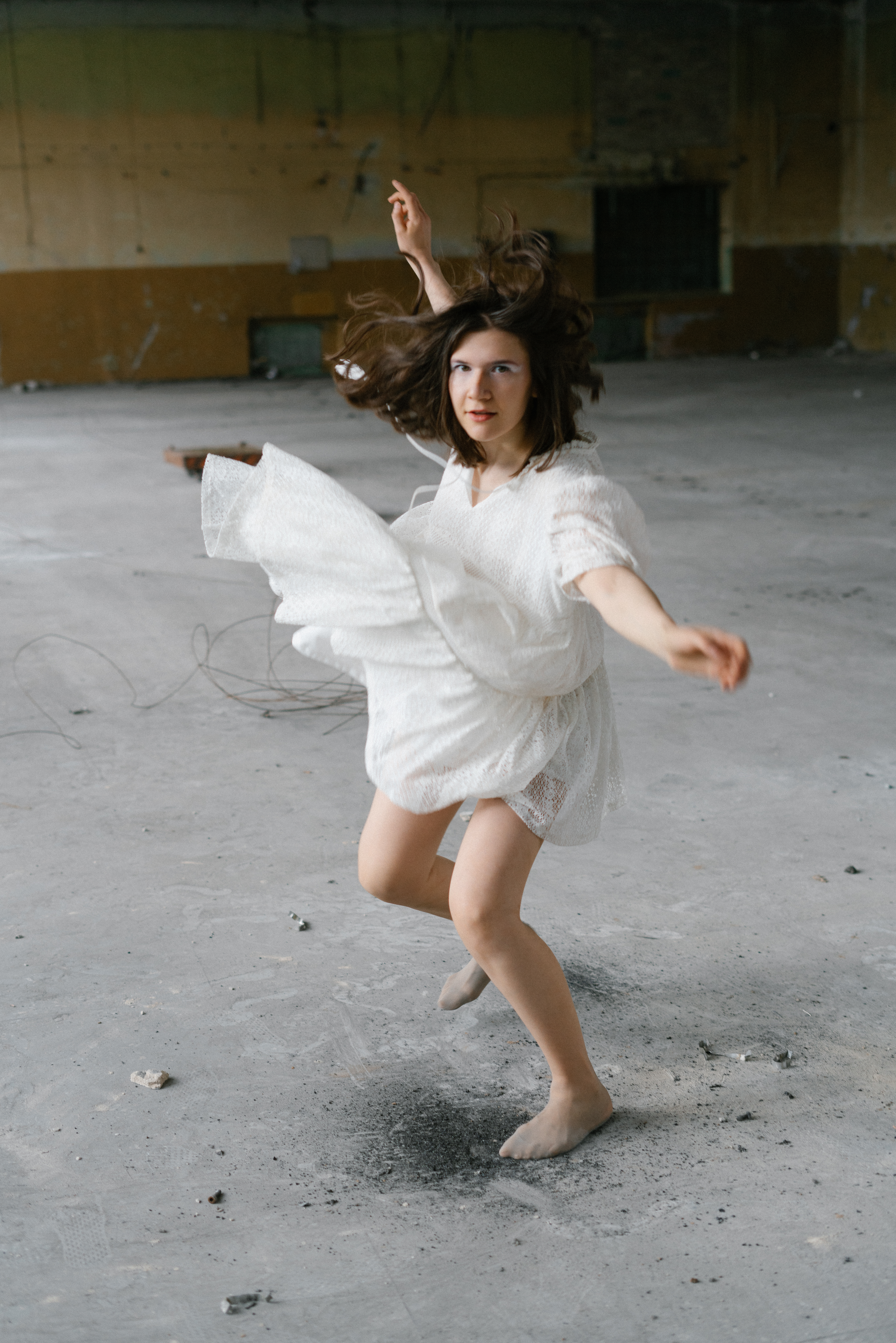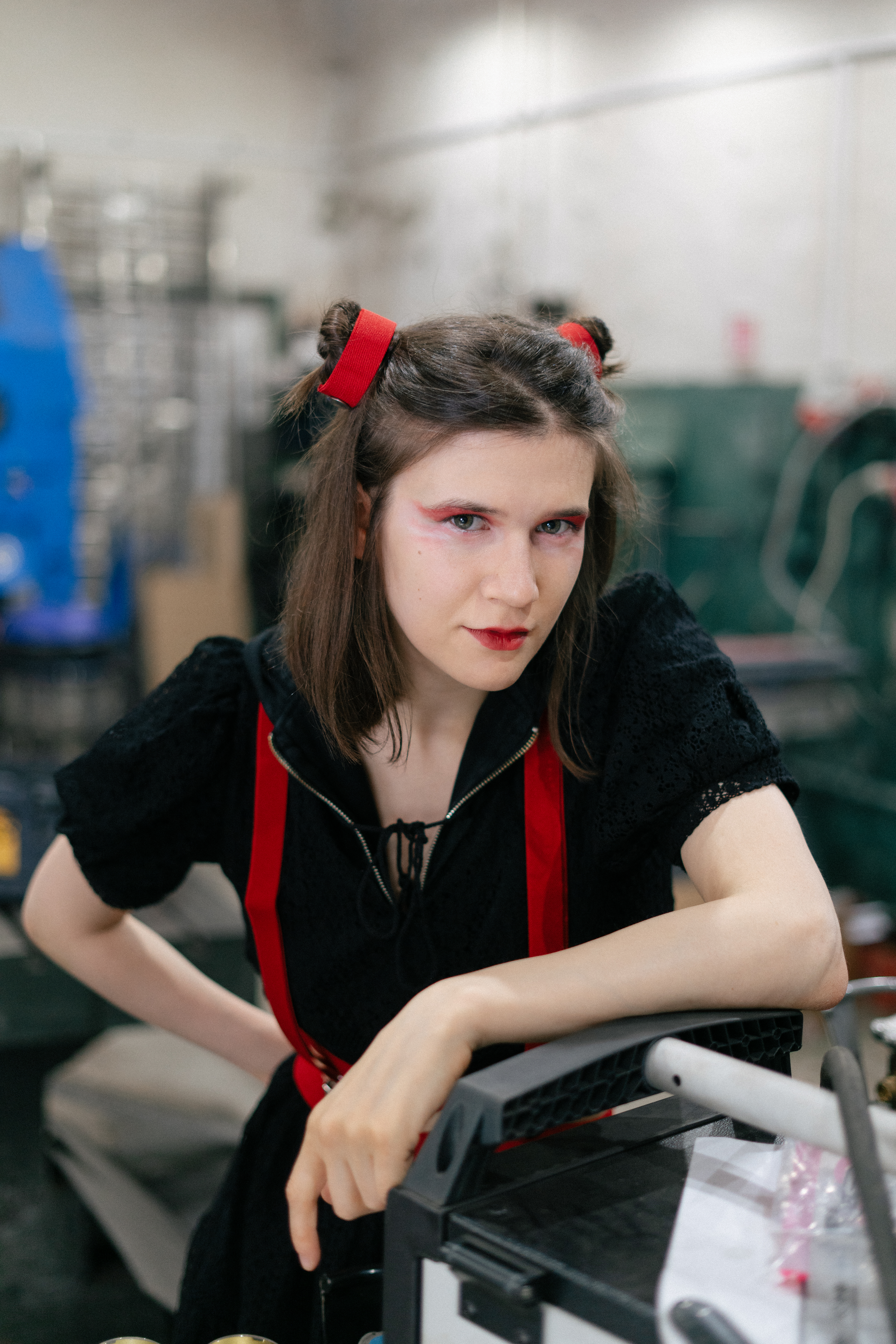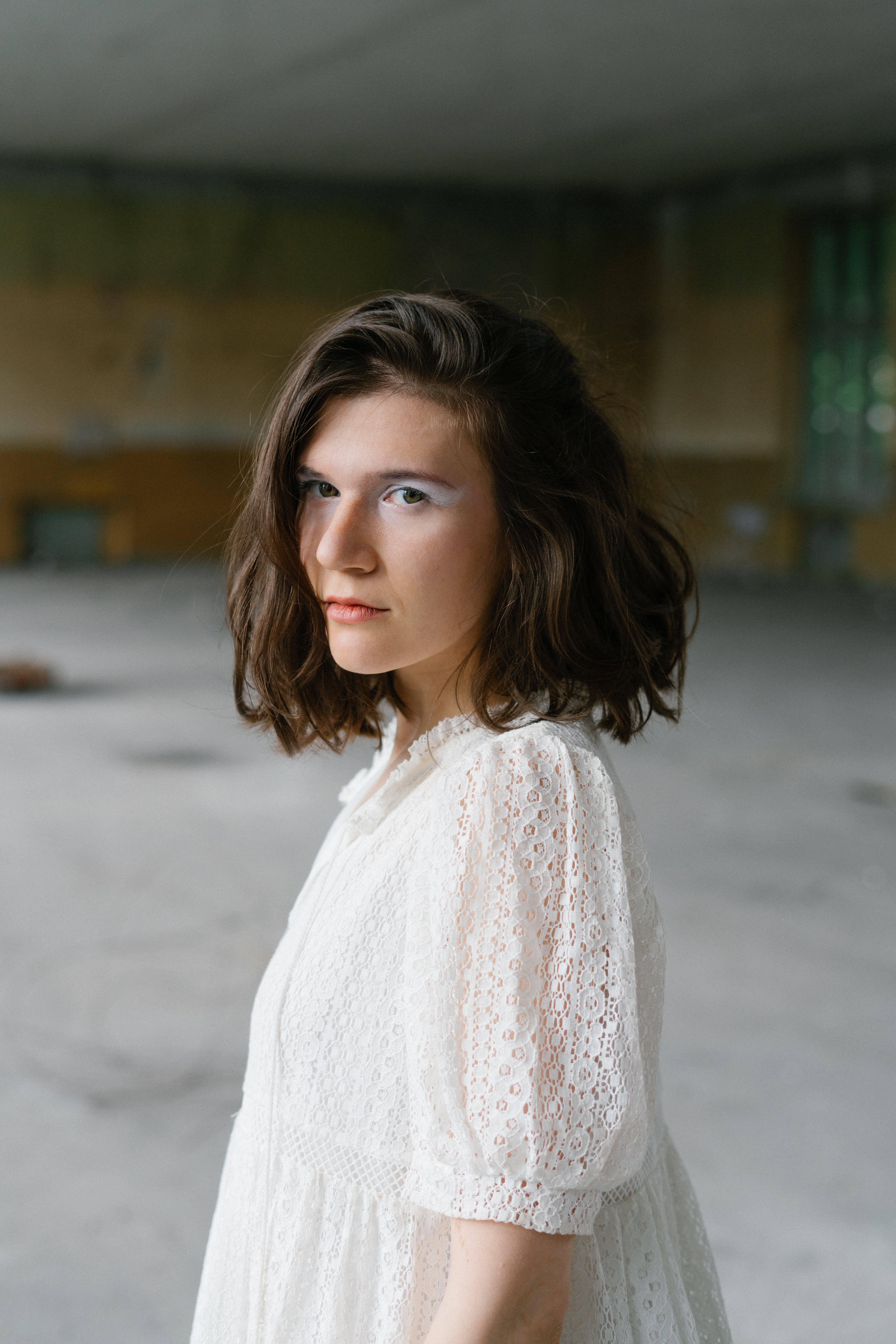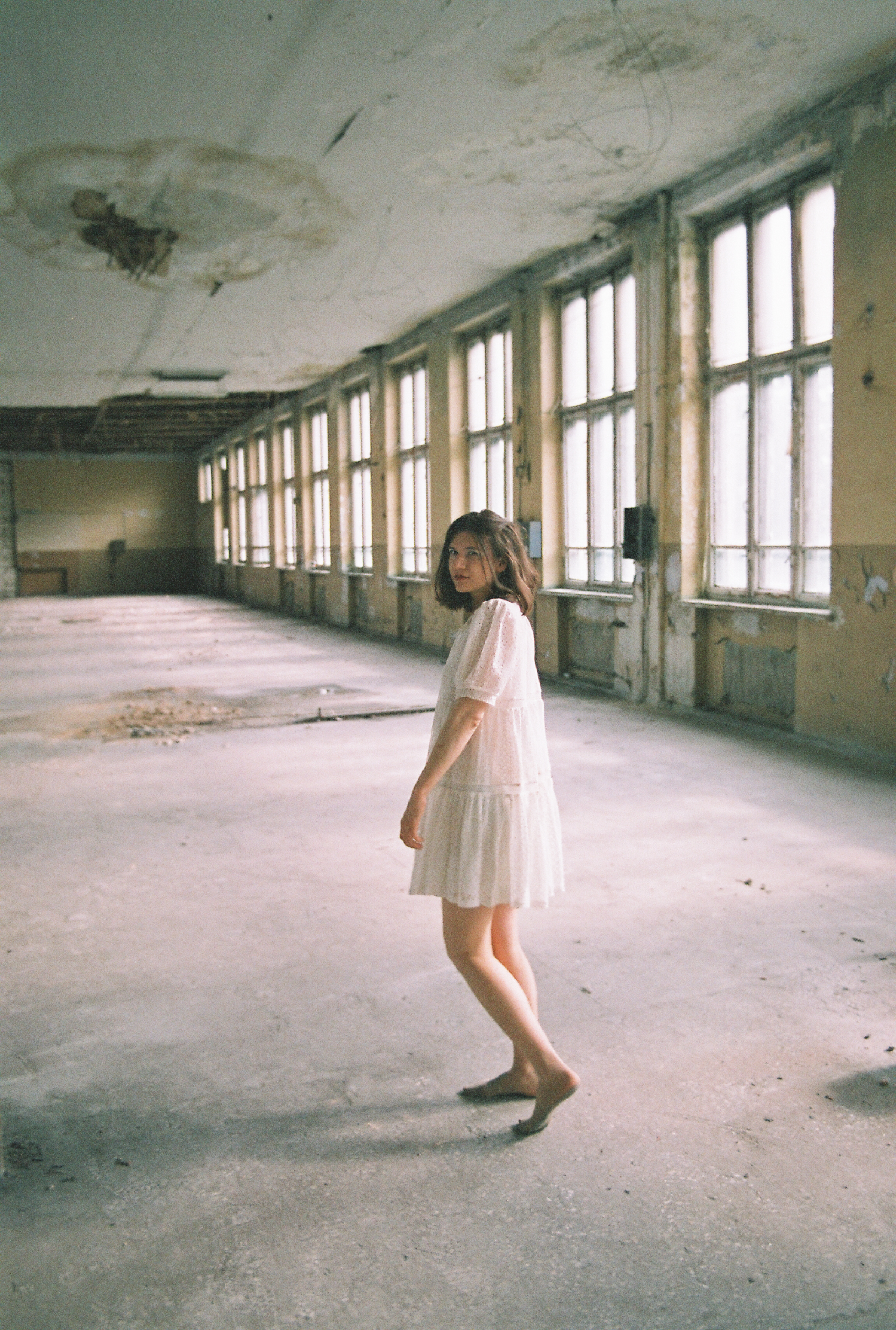Justina PALTANAVIČIŪTĖ | Monika Zenkevičiūtė-Monikaze: Creating Music Is Like Quenching Your Thirst
Best known as a composer of electronic music, Monika Zenkevičiūtė-Monikaze wrote her first pieces as a child, but it was much later in Bristol that she discovered her real artistic self during what was supposed to be a leisure trip. A graduate of the Lithuanian Academy of Theatre and Music, she has already released two albums, Chicken Wings and Waste of Space, the third coming out soon as a result of her collaboration with the St Christopher Chamber Orchestra. The new recording features her electroacoustic project, Laws of Distraction. The winner of the M.A.M.A. Electronic Music Award in 2022, the nominee of Music Moves Europe Awards, she recently signed a contract with the London-based label Moshi Moshi Records.
The success, she says, is reason to be happy, yet she sees her creative mission primarily in sharing the wonder of music with other people. For her, presenting newly discovered soundscapes to the listener is the main source of inspiration with no additional incentives required. So making music is a natural daily condition – mental and physical – for Monika, interviewed here by Justina Paltanavičiūtė.
How would you introduce yourself?
First off, I’m a composer, as that’s what I started with. I would also add that I’m a writer, producer and performer of electronic music. That’s it, more or less, anything else would be excessive.
What’s the meaning of your stage name, Monikaze?
This is what my father used to call me, because as a child I was like a kamikaze, having too much energy and breaking my parents’ stuff. He rarely spent time with my sisters and me, so the nickname for me is one of just a few memories about him. While in Bristol, I got a chance to know him better, and it was there that I got more involved in the making of electronic music, so it was natural for me to associate my stage name with my memories. In addition to that, ZE are the first two letters of my family name, yet another nice connection. I’m impulsive and spontaneous, and the decision about the stage name was impulsive and spontaneous too, but I have no regrets.
What kind of experience pushed you closer to electronic music in Bristol?
It was a combination of incidents and minute details, so it would be difficult to name just one particular experience. I’d been interested in electronic music well before arriving in Bristol, but while I was there I lost my ties with all of my former friends and acquaintances and so discovered a space for a thorough analysis of myself. Eventually I started focusing on what was dear to me, not to my friends. I spent time the way I wanted, so I took a year-long break in my studies, giving myself a kind of official permission not to rationalise my decisions, which really helped in realising what it was I really craved for. Bristol, on the other hand, is a city of rich and diverse culture, so I had plenty of inspiration to be creative there.
Before leaving for Bristol, you studied composition with Mindaugas Urbaitis in Vilnius. What did you gain from him?
Yes, I was a composition student back then and I was very happy, I have to say. Urbaitis was shaping me in the human sense by teaching me to consider any phenomenon from a critical yet rational and objective point of view. The important thing I learned from him was that a person should always remain alert. He has shown me many composers and plenty of good music, some of which we used to analyse together. His ability of listening to music, even entirely new pieces, and assessing it objectively amazes me. I see it as a kind of otherworldly capacity, because objective assessment of something you hear or see for the first time is a very tough task.
You went to the Lithuanian Academy of Music and Theatre to study kanklės. This traditional string instrument, it seems, is very far away from your current image and music.
I’m very happy to have had what I call my kanklės period. It’s not what you do but how you do it that’s important. I started playing kanklės because I needed to be with music. I had finished piano lessons at music school but had no real experience in music afterwards. My sister was studying kanklės then. I felt I wanted to play the instrument too to vent my frustration. One time I grabbed her kanklės and started playing, and this proved to be a decisive moment, as it laid the foundation for everything I do now and inspired me by accelerating my unbridled passion for music. I played a lot, even with bleeding fingertips. At night I had dreams about strings breaking while I played. Two years on, I joined the LAMT to study kanklės. It’s this instrument that I feel so grateful to, because it has changed my personality.
Do kanklės resonate in your current music?
I have to admit, sometimes I completely forget that kanklės was once so important in my life. Yet it inevitably resonates, because everything leaves a trace in our lives, even very small deeds and experiences.
How do you use your experience in traditional composition while making electronic music? And, the other way round, how does electronic music influence your academic composition?
For me, the two worlds are very closely linked and intertwined. Initially, my thinking while making electronic music wasn’t really that different to what I did in the academic context. Later, though, I noticed that writing for acoustic instruments requires attention to the form, which calls for more horizontal, not vertical, thinking. In electronic music, composers usually focus on timbral discoveries, which is much more difficult writing for traditional instruments. Composing traditional music involves more imagination. Writing for clarinet, for instance, and using Sibelius I am able to hear the music, yet I will need to imagine any of the clarinet’s unconventional timbres. Later, when a clarinetist takes the score, I will see my music born anew, altered. Any composition for an acoustic instrument is like a living organism, which has its own consciousness and might change considerably depending on the circumstances. Electronic music is a completely different story, as it sounds exactly the way you make it to. Electronic music nevertheless means freedom to me and, with it, an unlimited scope of opportunities. It opens up spaces for inventing my own soundscapes, which first emerge in my head and then I make them a reality available to the listener.
Are you an intuitive artist?
Yes, I’m a person of intuition, and this is why I rely on my subconscious where plenty of queries occur. But I tend to be very cautious about what I allow into it. That is a way of controlling its content, which is later transformed and broadcast in the musical form. While making music, however, I strive for a balance between intuition and rationality, so I tend to include my rational me in certain musical solutions. These solutions are often linked to the main message I want to convey with my piece.
Speaking of the messages within your compositions, are they musical or extramusical, external as it were?
Early on, I didn’t think of any messages at all, because I saw music as a means to articulate what was inside me. Gradually I started discovering certain themes accumulating within me and then exploding – as if unexpectedly. Soon after signing a contract with Moshi Moshi Records, they asked me to tell them more about one of my albums. I’d never done anything like that before, and it was then that I naturally started thinking of what my music was about and why. The core of my music, I have to admit, is not that I really want to express something by means of it, as what I truly like the most is the music itself and the process of making it.
You said once that the broader the choice, the more miserable someone might feel. Do you try to control your own musical choices?
Once an idea or a soundscape comes into your mind, it brings a certain colour or mood with it, and this is when the scope of options naturally diminishes. It becomes narrower right at the moment you decide which instruments you will use or when you receive a commission that includes such limitations. There are plenty of different reasons restraining the range of choices or moving it in a certain direction. Sometimes your choices are yours, and sometimes they have their own track and you just have to run after them, like a short-legged dog.
What inspires you in music?
I find myself in a condition where I don’t even need inspiration as such, because I am moving forward unaided. Writing music is a physical necessity for me; it has become a daily routine or ritual. For me, writing music is no less natural than walking down the street or drinking water if I feel thirsty. There are moments, I have to say, when I feel inspired as a person, like being with a musician I like or a nice concert. Recently I went to Iceland, and I still see its waterfalls, mountains and beautiful people in my dreams. Faced with the grandeur of the country’s nature, I felt so weak and small, my legs were trembling. This is also what inspires me greatly.
You don’t consider the audience your primary focus, according to one of your interviews. What is it that you think of while making music? Or is music perhaps just a means of self-expression?
I’m definitely not the type of artist who doesn’t care about the listener. I make music because I want to share the soundscapes I discover. The intention of broadcasting myself through music is alien to me, although self-broadcasting through music is inevitable because music reflects my inner world. I want the listener to hear what I hear – a harmonic slide, a scope of timbres or something else. I don’t consider these harmonic slides or scopes of timbres my own, I just discover them in my head, tiny particles of unconscious influences that eventually form a nice puzzle. The sounds I discover are completely new to me sometimes, so I’m not able to trace back their influences and the ways they stuck together. I consider it mystical. I enjoy them as phenomena of music rather than my own creativity. It is a pure wonder, I believe, that music has such power of influence on us. I want the listener to experience the same sensations I feel.
What is music to you?
Putting it the romantic way, I would say music is my alternative world.
What is a composer then?
From a book I once read, I remember a simple thing – creating something new only takes adding two things that had never been together before. Simple, isn’t it? Yet a deeper analysis reveals that any novelty is just an illusion. We are not capable of experiencing objectivity, because we do not have the appropriate senses. We live surrounded by illusions we have invented, and then we create the foundations and rules of our lives based on these illusions, because we need certain reliable things to prop us up. The word ‘composer’ is therefore just a title for me. But surely, you might prefer a more ‘artistic’ description, which portrays a composer as a man or woman who needs little and wears rags, an introvert who loves living alone and seeks for the illusion of newness. Such a character, in addition, drinks plenty of coffee, sleeps randomly and roams for hours on end.



